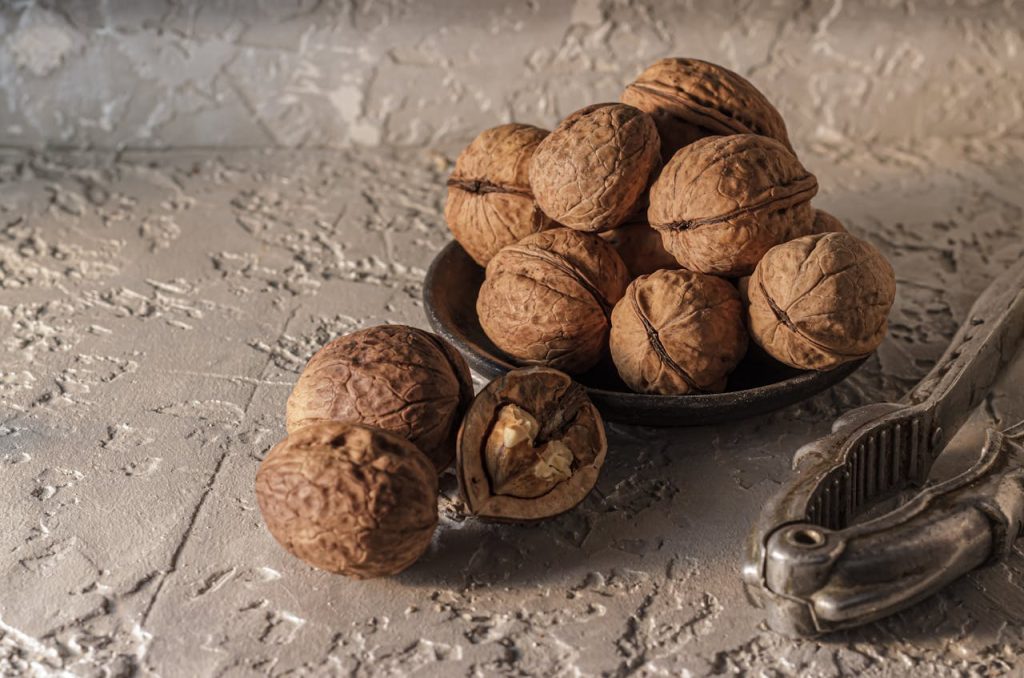Can Dogs Eat Walnuts? Walnuts aren’t the safest choice for dogs and it is best advisable to get the full explanatory details that will put your mind at rest. For canines, walnuts are not the best option. However, for humans, nuts are a nutrient-dense snack that is healthy for you, but these tasty, protein-rich treats aren’t the best option for your canine.
The risks of feeding walnuts to dogs vary from intestinal blockages and GI distress to severe conditions like pancreatitis, so it’s best to keep this specific snack to yourself even though it’s difficult to ignore your four-legged friend’s longing eyes while you’re munching on nuts like walnuts.
Because eating too many walnuts can actually be as toxic to your cat as munching on a chocolate bar, walnuts can be especially dangerous for our pets. Human Meals That Canine Poisonous
Contents
Can Dogs Eat Walnuts?

You are here because you need an answer to the question ‘ Dogs Eat Walnuts? It’s probably not going to harm your dog if a walnut drops off your kitchen counter and gets taken. However, walnuts shouldn’t be given to your dog because they are prone to a specific kind of black mold that is extremely toxic to dogs.
Walnuts that have been picked from trees in the open without protection from the weather are not safe for pets, though it is unlikely to happen in high-quality walnuts that you might find at the supermarket store.
However, due to their high moisture content, walnuts can begin to develop fungi at any point during their growth process, from harvest to the shop shelf (regardless of whether they have been shelled or not).
When fungi colonize walnuts, some of them make mycotoxins, which are thought to be carcinogenic, while others create tremorgenic mycotoxins, which can result in tremors and seizures.
There are many other treats that are safe for dogs to eat as-is, so it might not be worth the effort to boil walnuts and thoroughly dry them to eliminate any potential mold.
The black walnut is a special variety of walnut that is particularly harmful to dogs. These nuts are indigenous to the Northeastern United States and Canada, and both canines and horses should avoid eating them (but, interestingly, not cats). However, keep in mind that English, not black, walnuts are usually what are sold in stores.
What Takes Place If Your Dogs Eat Walnuts
You are here because you need an answer to the question ‘ Dogs Eat Walnuts? So, the condition can be fatal if left untreated, particularly in a small dog, puppy, or geriatric dog. If your dog does inadvertently consume a moldy walnut or black walnut, signs to watch out for include vomiting, tremors, and seizures. Your veterinarian will need to be contacted right away.
Generally speaking, high-fat human foods like walnuts can upset your dog’s gut and cause typical tummy trouble signs, such as vomiting and diarrhea. Consuming walnuts, however, can occasionally result in the emergence of more severe conditions like gastritis or gastroenteritis.
While gastroenteritis results from an inflammation of the gastrointestinal system, especially the stomach, and intestines, pancreatitis is an inflammation of the pancreas that can either be acute or chronic.
Both of these ailments, particularly pancreatitis, have the potential to be extremely severe or even fatal for your dog.
The fact that prepackaged walnuts may also contain seasonings like salt or other additives that can be harmful to our pets, in addition to their high-fat content, is another reason to keep them away from your canine.
A Canine Can Become Seriously ill From Eating Too Much Salt.
If your dogs eat walnuts and you become panicking, the plain truth is; store-bought walnuts by themselves aren’t necessarily toxic to your dog in small amounts, assuming they don’t contain any black mold.
They are one of the larger nut types, though, so they may not only be challenging for Fido to digest but also pose a significant risk of intestinal blockages, especially in smaller breeds.
These blockages need to be surgically removed and, if left untreated, could be deadly. Additionally, there is a greater chance that the shell will result in a blockage if your dog eats a shelled walnut.
Another danger is choking because many dogs eat their food without chewing it, and a walnut’s round shape increases the likelihood that it will get stuck in the throat of an overly eager canine.
Do Walnuts Have Health Advantages for Dogs?

Now that you have gotten some explicit answers to the question; ‘ Dogs Eat Walnuts? However, the beneficial fats, protein, fiber, vitamins, and minerals found in tree nuts like walnuts, almonds, and hazelnuts have been shown to do everything from lower cholesterol and blood sugar to lower blood pressure in people.
Particularly fresh walnuts are a powerhouse of energy, anti-oxidants, and omega oils. Can our canine companions get the same advantages, though?
Related Article:
- Do chickens pee?
- Keeping Button Quail As Pets
- Can Dogs Eat Pecans? Is It Possible or Not?
- Is White Chocolate Bad For Dogs? 1 Quick Answer
- Dogs and Chicken Broth; Is it safe? 4 Beneficial Reasons
- Can Dogs Eat Arugula; And 13 Other Healthy Foods For Your Pet
According to experts, our canine counterparts are unable to fully benefit from nuts’ health advantages. Their digestive systems aren’t as capable of handling seeds as ours are.
The second problem is that, even if Rover were to benefit from some of the health advantages of walnuts, the negative effects of the nuts’ high-fat content would outweigh those advantages.
For context, an ounce of walnuts contains roughly 18 grams of fat, whereas a 30-pound dog should only consume about 14 grams of fat daily on average.
The risks associated with walnuts outweigh any possible advantages when combined with the potential for any type of fungi.
Can Dogs Eat Other Nuts?
Having gotten a response to your question ‘ Can Dogs Eat Walnuts? Veterinarians typically advise against giving nuts to canines, but the only ones that are thought to be slightly less harmful are peanuts, cashews, and almonds.
All of these nuts have nutrients like fiber and protein, but there is still a chance that they could upset your stomach or clog your intestines.
You should be particularly cautious with any nuts that have flavorings like salt. Macadamia nuts are never recommended for dogs as they are thought to be especially toxic to them.
If you do decide to give your dog nuts, make sure they make up a very tiny portion of their daily caloric intake.
Nearly all of your dog’s calories should come from balanced foods designed especially to meet its nutritional requirements.
Overindulgent treats and fatty foods can cause canines to become overweight or obese, which carries with it a number of health dangers like hypertension, kidney disease, and arthritis.
Ask a Vet
In case your Pet is Sick & Need Help we advocate you converse with a vet ASAP. JustAnswer means that you can discuss in real-time with veterinary consultants for a small price.
Can Dogs Eat Walnuts? The FAQ
You can find this section of the article interesting because its answers some basic frequently asked questions relating to the question; Can Dogs Eat Walnuts? that are asked by most pet owners.
If my dog consumes a walnut, should I force it to throw up?
If your dog picks up a walnut off the table or discovers one you dropped on the floor by mistake, it probably won’t hurt them.
Call your veterinarian or animal hospital right away if your canine exhibits symptoms like shivering or vomiting, or if you know the walnut was black rather than the English walnut that is typically sold in stores for human consumption. Except when explicitly instructed to do so by the vet, never try to make your dog throw up.
Is peanut butter safe for canines to eat?
Peanuts are essentially legumes, as opposed to walnuts, which are true nuts. In terms of protein and fat content, peanuts are comparable to walnuts, and like walnuts, your canine is likely to find them to be utterly delicious.
Generally speaking, dogs can consume tiny amounts of unsalted, unshelled peanuts with no problems. In moderation, peanut butter is also a tasty treat.
However, try to offer your dog natural peanut butter that is low in salt and sugar. And as always, your dog’s everyday diet should only include a small portion of these treats.
What other tasty treats should I offer my dog?
On the shelves of any pet store, supermarket, or big-box retailer, canine treats are available in what seems like an infinite number of brands and varieties.
Dogs typically enjoy bananas, apples, melons, and berries but avoid citrus fruits, so if you prefer to give your pet a treat that you could also eat, some good options include small pieces of cooked, unsalted meat without sauce, pieces of fruit, and occasionally treats of raw or cooked vegetables without sauces or salt. Carrots, green beans, broccoli, and green beans are all favorites of many canines.


